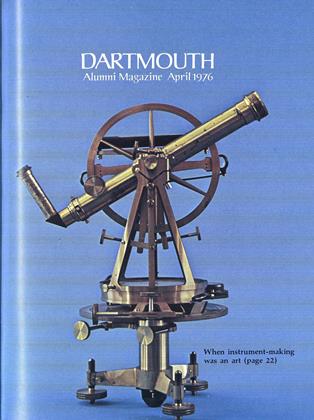Bearing the American flag at the head of the parade of athletes which opened the 1932 Winter Olympics at Lake Placid, later taking the oath of amateurism on behalf of all competitors, was JOHN A. SHEA '34, a hometown boy and a Dartmouth sophomore. Before the week was out, he was to become the first American double gold medalist in the Winter Games, winning the 500- and 1500-meter speed-skating events. Looking on was J. VERNONLAMB '46, at seven already a winter-sports enthusiast, like all good Lake Placiders.
Now, with Lake Placid designated as the site of the 1980 Winter Games, Shea and Lamb are absorbed in another Olympiad: Shea personally and in his official capacity as town supervisor, with major responsibility for housing, construction, and government relations; Lamb as chairman of the environmental council and of Nordic events, ski-jumping, and biathlon. Members of the organizers' executive committee, they have devoted countless hours to preparing the bid for the 1980 games, to testimony before state and federal legislative committees, to endless meetings on the innumerable details to be worked out before the symbolic flame is ignited. With a comparatively modest budget of $73 million, based on anticipated inflation, they and their colleagues are determined to check the commercialism, "to return the Olympics to the athletes."
Despite some skepticism abroad about the ability of an isolated mountain village of fewer than 3,000 souls to accommodate a modern-day Olympiad, the organizers think it not only feasible but ideal. If transportation and other facilities are inadequate for thousands of would-be spectators, so much the better. Theirs, Lamb and Shea contend, is a locale far more consistent with the Olympic aim of promoting international understanding through friendly sports competition than the sites of extravaganzas of the recent past. "This is where the Olympics belong," says Lamb. "In a city, the competitors get lost; here, they're it. The athletes can mix and mingle with each other and with the local people."
Lake Placid, they point out, is no run-of-the-mill mountain village. Within its own park district and on nearby state-owned facilities, it boasts the only bobsled run in North America, the greatest vertical descent in the East, and an arena which already meets Olympic figure-skating and hockey requirements. Nine miles will be the greatest distance between various events, compared with 65 at Grenoble, 45 at Sapporo, and a proposed 115 at Denver.
Sports-minded almost to obsession, village residents include probably more former Olympic competitors - well over 60, among them Shea's and Lamb's sons - and more internationally accredited judges than any other community. Its secret weapon, the men claim, is "the world's most dedicated cadre of volunteers." Where Denver had spent $1 million in salaries before its 1976 bid aborted, the Lake Placid organizers donate their time, with everyone pitching in as needed.
Environmental impact will be minimal, says Lamb, whose council has worked closely with such conservation groups as the Sierra Club and the Adirondack Mountain Club. There are no grandiose plans for new airports or highway systems to disturb the land, and both public and private facilities are already subject to rigid park codes.
That there is much to be done, neither man denies. Major construction, an economic bonanza to a county plagued with unemployment rates of nearly 17 percent, will include a new field house, a 90-meter ski jump, and a luge run. The bobsled run and speed-skating track are to be refrigerated, snow-making equipment installed on all Alpine slopes, and four new downhill runs built on Whiteface Mountain. An Olympic Village for an estimated 1,200 competitors and 600 officials and coaches is a matter still to be decided. A nearby drug rehabilitation center, due for phasing-out, may be remodeled for the purpose; private facilities plus trailers offer one possible alternative.
The guiding principle, Shea says, is to build only what will have a feasible economic after-use. He envisions for postOlympic Lake Placid "the first complete winter-sports training center in the country, perhaps the best in the world."
"Olympics in Perspective" is the by-word in Lake Placid. If there are any doubts elsewhere that a little mountain village in the Adirondacks can find happiness as host to the 1980 games, they are not shared by Jack Shea, Vera Lamb, or the rest of the hometown folks.
Shea, on left, and Lamb at thearena used for the '32 Olympics.
 View Full Issue
View Full Issue
More From This Issue
-
 Feature
FeatureWORDS AND PICTURES MARRIED The Beginnings of DR.SEUSS
April 1976 By Edward Connery Lathem -
 Feature
FeatureStrangers in the House?
April 1976 By RAYMOND L.HALL -
 Feature
FeatureLap After Grim Lap, Note After Sparkling Note
April 1976 By DAVID M. SHRIBMAN '76 -
 Feature
FeatureTHE 18th century highboys of Benjamin Randolph's
April 1976 By ALLEN L. KING -
 Class Notes
Class Notes1975
April 1976 By GILBERT F. PALMER IV, FREDERICK H. WADDELL -
 Article
ArticleVox Clamantis et Clamantis; or College Bites Man
April 1976 By TERENCE R. PARKINSON '71
M.B.R.
-
 Article
ArticleTop Yard Cop
December 1973 By M.B.R. -
 Feature
FeatureRock chronicler
May 1974 By M.B.R. -
 Article
ArticleOf Ancient Mariners... and Monsters of the Deep
September 1975 By M.B.R. -
 Article
ArticleAce the Spaceman, Electronic Medicine Man of the Amazing X Nation
April 1977 By M.B.R. -
 Article
ArticleLiberal Learner
March 1979 By M.B.R. -
 Cover Story
Cover StoryThe Fourteenth President
March 1981 By M.B.R.
Article
-
 Article
ArticleFRATERNITY REPORT SUBMITTED
May 1936 -
 Article
ArticleREADINGS
OCTOBER 1988 -
 Article
ArticleL'Ecole Tuck
December 1950 By C.E.W. -
 Article
ArticleBack where it all began: Al McGuire at Dartmouth
MAY 1986 By Jim Kenyon -
 Article
ArticleTHE UNDERGRADUATE CHAIR
January 1935 By Milburn McCarty IV '35 -
 Article
ArticleTHE STATE OF THE COLLEGE IN 1780
February, 1914 By Silvanus Ripley

